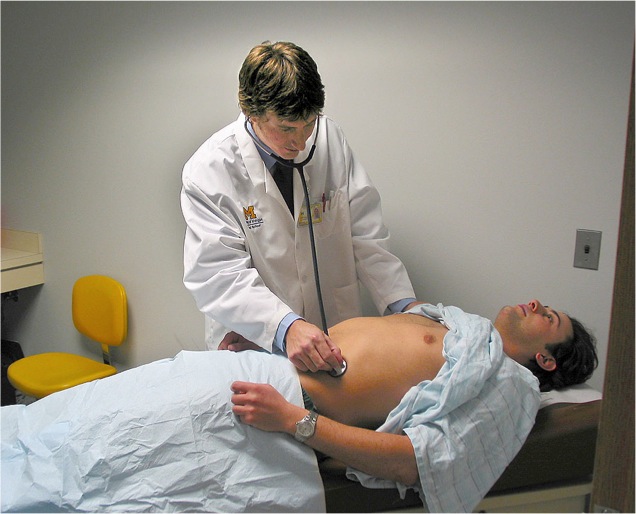A guy walks into an emergency room. He tells the doctor, “I’ve got abdominal pain. Can you help me with my (IBS)?” The doctor shakes her head and says, “No, but I can help you with your misdiagnosis!”
Yeah, it’s a terrible joke, but it represents a worse reality for people with hereditary angioedema (HAE). Not only are they often the victims of misdiagnosis—an estimated 30% are also the victims of unnecessary surgery.
That’s more or less what happened for the real-life guy featured in our little joke. Thirty-two years old and misdiagnosed with IBS, he finally got a real answer of HAE when physicians connected his recurring stomach woes to a family history of aches and swells.
Unfortunately, doctors usually try several diagnostic punchlines first, not considering (or even knowing) that HAE is an option. It can take seven or eight years, if not longer, before the majority of people get an accurate diagnosis.
So what can you do about it?
If you have a bad feeling about the doctor’s explanation—or you’re dealing with healthcare professionals who won’t accept that yes, you have HAE, and yes, it’s real—here are a few facts to help you convince the peanut gallery that it’s HAE, not…
-
Gastrointestinal Conditions

Abdominal HAE attacks seem pretty unique: stabbing pain, repetitive vomiting, distended stomach—what else could cause that?
Well, apparently a lot.
Turns out, you’ll find those kinds of symptoms across the spectrum of gastrointestinal (GI) conditions, which leads to years of diagnostic confusion and, in some cases, irreversible damage.
To help avoid this, I encourage you to remember what’s in a name. Literally. What’s in the name hereditary angioedema?
The word “hereditary,” for starters.
Family history can be your head-liner for getting a successful diagnosis. Just compare what family history means for HAE versus something like IBS. It’s safe to say that IBS generally runs in families. However, the lineage is still up for debate and far less specific than it is with HAE, which we know can be inherited directly from an HAE-positive parent.
Use this to your advantage. If your parents, aunts, uncles, grandparents, etc., have HAE-like symptoms, it very strongly suggests that that’s what’s happening with you, too.
Of course, this doesn’t help the 20-25% of people without a family history. But don’t worry! You may not have a family history, but you do have a personal history.
This is the one time the “edema” part of “angioedema” can be your friend. They say you have acute appendicitis? That you need emergency surgery? Bring up the hand swell you had three months ago or point out the recurring nature of your attacks. You can even have a friend or family member mention it if you’re not in a condition to speak up.
If you only experience abdominal swells, you won’t have a wide range of symptoms with which to justify screaming at the doctor, “A-ha! Explain that one!” That doesn’t mean your bag of tricks is empty, but it does mean you’ll need to dig deeper into each diagnosis.
Anything that doesn’t completely align with the doctor’s diagnosis is worth mentioning. They diagnose you with IBS? Know that IBS is largely considered a non-inflammatory illness. Tell them that your GI tract’s got swells to spare!
Give your doctors reasonable doubt—just enough to delay unnecessary surgeries and open your healthcare team to other diagnostic possibilities.
-
Allergies

Ah, allergies, everyone’s favorite diagnosis. It’s good for explaining away pretty much any symptom, which is a disaster for people with HAE.
This is the one time where being superficial can work in your favor. HAE swells may resemble, say, food or bug allergies at first glance, but the devil (or I suppose the angel) is going to be in the details.
Take urticaria, aka hives: Hives are a pretty expected part of the whole “allergy package deal,” but they’re not something people with HAE are exactly known for. Granted, they may get hives occasionally, but it’s not in direct relation to an HAE attack. In fact, the rash that does come along with HAE tends to be flat; the complete opposite of hives.
Maybe you don’t get a rash though. Maybe you get fatigued or tingly before an HAE attack. Pay close attention to those kinds of early warnings; they actually provide further evidence that the only thing you’re allergic to is misdiagnosis!
If your doctors remain stone-faced, do what any good comedian does: test your material and adjust accordingly. Some doctors may take one look at your swollen hand and give you a handful of antihistamines, which have no effect on HAE attacks.
(Benadryl isn’t exactly created for the bradykinin-crowd.)
As ridiculous as it is–and as long as you’re not dealing with a throat swell–you could try what you’re given. The medicine won’t help you physically, but diagnostics is often a game of elimination. By documenting your lackluster response to allergy medicine, you may manage to “boo” one more misdiagnosis right off the stage.
-
Psychosomatic Symptoms

This might be the trickiest category for any rare disease, partially because the relationship between the mind and body is real and relevant to so many situations. It should be treated with the validation and seriousness it deserves.
That’s not the problem. The problem is when doctors look at physical manifestations of your condition (in this case, HAE) and dismiss them as having no physical cause whatsoever. This is not helpful in any way shape or form; not for people truly suffering from psychosomatic symptoms and not for people with undiagnosed HAE.
As much as possible, you can’t let the words “it’s all in your head” get inside your head.
HAE is often misdiagnosed because physicians lack knowledge—not because your symptoms lack a physical cause. Genetic tests and blood tests can help prove this by measuring levels of C1-inhibitor (which are low in 85% of HAE patients) or C1-inhibitor function.
A positive HAE test is priceless, but for anyone with type-III HAE, whose levels are all normal, these tests can’t offer much comfort. This doesn’t mean you should give up! Continue to trust in yourself—do your research and show that information to the doctor. Turn to the HAE community for support, and if possible, advocate trying an HAE treatment. You never know: like with allergies, your treatment response could be the closer you’re looking for.
Family history, detailed symptom accounts, treatment response, diagnostic testing, and ultimately, your own self-confidence: these are the only tools you have against a room full of hecklers.
Stay educated and always trust your instincts. HAEters may hate, but one day, when the medical community catches up to its patients and you’ve got your proper diagnosis in hand, I promise the joke will be on them.






